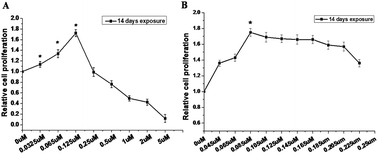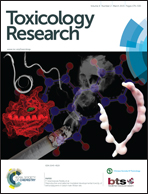Exposure to low dose cadmium enhances FL83B cells proliferation through down-regulation of caspase-8 by DNA hypermethylation
Abstract
Cadmium (Cd) is classified as a human carcinogen probably associated with epigenetic change. However, its underlying mechanism and role in epigenetics is still poorly understood. DNA methylation is one of the epigenetic mechanisms by which cells control expression. Our previous in vivo experiment has shown that caspase-8 gene promoter of the rat liver tissue was hypermethylated in Cd at 20 nmol kg−1 for 4 weeks. In the present study, we will disclose whether DNA methylation is also involved in this Cd-stimulated FL83B cell proliferation. When the FL83B cells were exposed to Cd at a low dose (0.085 μM) for only 14 days, cell proliferation and DNMT methyltransferase expression and activity increased, while the mRNA and protein of tumor gene caspase-8 decreased remarkably, along with a significant decrease in cell apoptosis and increase in cell invasion and metastasis. Furthermore, caspase-8 gene promoter in Cd-exposed Fl83B cells was hypermethylated, consistent with our in vivo experiment. A DNA methylation inhibitor, 5-aza-2′-deoxycytidine (5-aza-dC), prevented Cd-stimulated cell proliferation, invasion and metastasis associated with recovered caspase-8 expression. These results suggest that low dose Cd may induce caspase-8 gene promoter hypermethylation, resulting in down-regulation of its expression, and consequently promoting cell proliferation, invasion and metastasis and decreasing apoptosis, both of which would contribute to Cd-induced carcinogenesis.


 Please wait while we load your content...
Please wait while we load your content...